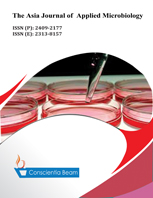In-Vitro Study on the Effect of Endogeic Earthworm on Blood Disease Bacterium (BDB) in Banana- A Preliminary Observation
DOI:
https://doi.org/10.18488/journal.33/2016.3.1/33.1.1.11Abstract
Blood disease is a wilt disease that greatly affects the banana cultivation. Besides chemicals, the utilization of natural soil-biological entity may provide an alternative in searching for effective and environmental friendly approach against the disease. Endogeic earthworms are known as soil-engineers that modify soil properties that may favor or suppress different microbial populations. In the study, the effect of endogeic earthworm, Pontoscolex corethrurus on blood disease bacterium (BDB) was evaluated through in-vitro study. Earthworm casts, mucus and worm-worked soil collected were inoculated onto tetrazolium chloride (TZC) medium seeded with BDB at different concentrations. Molecular identification using 16S rRNA primers was then performed to identify the microbial isolates that inhibited BDB. Phylogenetic tree was constructed to determine the similarity among the isolates with Pseudomonas sp. sequences deposited in the GenBank. The results showed that bacterial colonies from earthworm mucus inhibited BDB at 103 and 105 cell/ml. However, no inhibition was observed at higher BDB concentration (107 cell/ml). Similarly, earthworm cast and worm-worked soil did not show inhibition towards BDB. Bacterial isolates obtained from earthworm mucus were classified into the genus Pseudomonas. The study suggested the potential role of P. corethrurus in enhancing the growth of beneficial microorganism in remediating blood disease.

